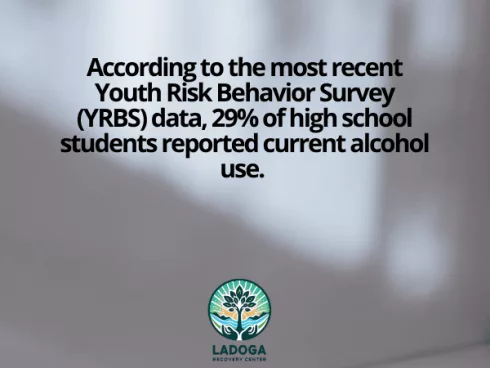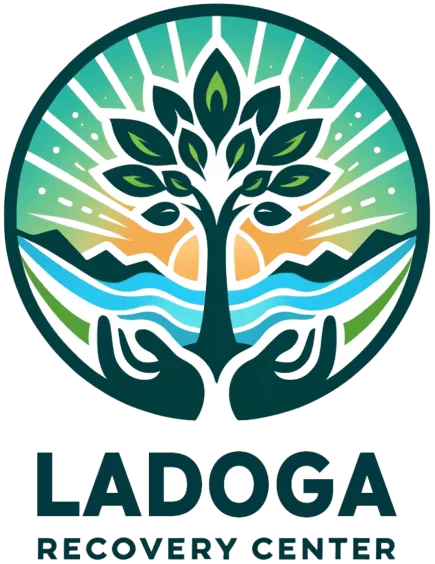Substance abuse continues to be a major public health crisis in the United States, affecting millions of individuals and families. March marks National Drug and Alcohol Facts Week (NDAFW), a nationwide initiative dedicated to educating the public about the dangers of drug and alcohol misuse and dispelling myths surrounding addiction.
At Ladoga Recovery Center, we believe that awareness, education, and professional treatment are key to fighting addiction and promoting recovery. NDAFW provides a critical opportunity to spread accurate information about substance abuse, encourage open conversations, and highlight evidence-based treatment options such as our Detox Treatment Program, Residential Treatment Program, and Inpatient Treatment Program.
This article explores the significance of National Drug and Alcohol Facts Week, key facts about substance use disorders (SUDs), and how individuals struggling with addiction can take steps toward recovery.
What is National Drug and Alcohol Facts Week?
The Origins of NDAFW
National Drug and Alcohol Facts Week (NDAFW) was launched in 2010 by the National Institute on Drug Abuse (NIDA) and later expanded with support from the National Institute on Alcohol Abuse and Alcoholism (NIAAA). This annual event aims to:
- Debunk common myths about drug and alcohol use.
- Provide scientific facts about addiction and brain function.
- Encourage open conversations between youth, parents, and educators.
- Highlight the importance of treatment and prevention programs.
Each year, organizations, schools, and communities across the U.S. participate by hosting events, workshops, and social media campaigns to raise awareness about substance abuse.
NDAFW serves as a powerful reminder that addiction is a treatable disease and recovery is possible with the right support and resources.
Key Drug and Alcohol Facts You Should Know
During National Drug and Alcohol Facts Week, it’s crucial to understand the realities of addiction, its widespread impact, and the importance of early intervention. Below are some key statistics and facts about substance use in the United States.
1. The Prevalence of Substance Use Disorders (SUDs) in the U.S.
- Over 46.3 million Americans aged 12 and older had a substance use disorder (SUD) in 2021.
- Alcohol Use Disorder (AUD) affects 28.9 million individuals, making it one of the most common addictions.
- Opioid overdoses claimed over 80,000 lives in 2021, highlighting the ongoing opioid epidemic.
- Marijuana use among young adults (ages 18-25) is at an all-time high, with over 43% reporting use in the past year.
2. The Science Behind Addiction: How Drugs and Alcohol Affect the Brain
Many people mistakenly believe that addiction is a choice or a moral failing. However, research shows that addiction is a chronic disease that alters brain function, making it difficult to stop without professional help.
- Drugs and alcohol hijack the brain’s reward system, flooding it with dopamine and reinforcing substance use.
- Chronic drug use impairs decision-making abilities, increasing impulsivity and risk-taking behaviors.
- Long-term substance abuse rewires brain circuits, making cravings and withdrawal symptoms stronger.
Understanding the science behind addiction helps reduce stigma and encourages individuals to seek professional treatment.
3. The Dangers of Commonly Abused Substances
Substance abuse can impact every aspect of a person’s life—health, relationships, and financial stability. Below are some of the most commonly abused substances and their risks:
Alcohol
- Causes liver disease, heart problems, and cognitive impairment.
- Increases the risk of depression and mental health disorders.
- Heavy use can lead to severe withdrawal symptoms requiring medical detox.
Heroin and Opioids
- Highly addictive with a high risk of overdose.
- Can cause respiratory failure and brain damage.
- Medication-assisted treatment (MAT) can help manage opioid withdrawal.
Cocaine
- Leads to heart attacks, strokes, and high blood pressure.
- Can cause paranoia, anxiety, and long-term mental health issues.
- Requires inpatient treatment for safe withdrawal and recovery.
Marijuana
- Linked to cognitive decline and mental health disorders.
- Can cause cannabis use disorder, requiring professional treatment.
Benzodiazepines (Benzos)
- Prescribed for anxiety but highly addictive.
- Withdrawal can be life-threatening without medical supervision.
- Inpatient detox programs help individuals safely recover.
If you or a loved one is struggling with any of these substances, seeking professional help is the first step toward recovery.
How to Take Action During National Drug and Alcohol Facts Week
NDAFW is more than just a week of awareness—it’s a chance to make a real difference in your life and your community. Whether you’re struggling with addiction or supporting someone in recovery, there are many ways to get involved.
1. Educate Yourself and Others
- Read scientific studies and reliable articles on drug and alcohol addiction.
- Follow organizations like NIDA, SAMHSA, and CDC for up-to-date information.
- Share facts and statistics on social media using #NDAFW to spread awareness.
2. Encourage Open Conversations
- Talk to friends, family, and young adults about the dangers of substance abuse.
- Break down stigma by discussing addiction as a disease, not a moral failing.
- Support workplaces and schools in hosting educational events and workshops.
3. Seek Treatment If You or a Loved One Needs Help
- If you or someone you know is struggling with addiction, seeking professional help is the best decision.
- Treatment programs like those at Ladoga Recovery Center offer personalized care to help individuals regain control over their lives.
The Role of Prevention in Combating Substance Abuse
While treatment programs are essential for helping individuals recover from addiction, prevention efforts play a crucial role in reducing substance abuse rates before they escalate into serious health crises. National Drug and Alcohol Facts Week emphasizes the importance of early education, community engagement, and proactive intervention strategies to stop addiction before it starts.
1. The Importance of Early Education
Studies show that individuals who learn about the dangers of substance abuse at a young age are significantly less likely to develop addiction later in life. Parents, educators, and healthcare providers play a key role in prevention by:
- Discussing the risks of alcohol and drug use early with children and teens.
- Providing factual, science-based information about how substances affect the brain and body.
- Encouraging healthy decision-making and coping strategies to handle stress without substances.
- Leading by example by maintaining a responsible approach to alcohol and prescription medication use.
2. Community Engagement and Support Programs
Communities can help prevent drug and alcohol misuse by promoting awareness and offering support resources. This can include:
- Hosting educational events, workshops, and school programs that focus on substance abuse prevention.
- Providing accessible mental health resources for those struggling with anxiety, depression, or trauma, which often lead to self-medication.
- Encouraging mentorship programs that connect at-risk youth with positive role models.
- Establishing support groups for individuals and families affected by addiction.
3. The Role of Healthcare Providers in Prevention
Healthcare professionals are on the front lines of addiction prevention and can make a significant impact by:
- Screening patients for early signs of substance abuse during routine check-ups.
- Offering early intervention programs for those showing signs of dependence.
- Providing alternatives to addictive medications when possible.
- Referring individuals to mental health and addiction treatment services before substance abuse worsens.
4. The Link Between Mental Health and Substance Abuse Prevention
Mental health and substance use disorders often go hand in hand. Many individuals turn to drugs or alcohol as a way to self-medicate for anxiety, depression, or PTSD. By addressing mental health concerns early on, individuals can develop healthy coping mechanisms and reduce the likelihood of substance abuse.
At Ladoga Recovery Center, we recognize the importance of integrating mental health support into addiction treatment. Our programs include:
- Cognitive-Behavioral Therapy (CBT) to help individuals recognize and change negative thought patterns.
- Dual Diagnosis Treatment for those struggling with both addiction and mental health disorders.
- Mindfulness and stress-management techniques to promote healthier ways of handling emotions.
Why Prevention Matters
While treatment is essential for those already struggling with addiction, prevention is the key to reducing the number of individuals who develop substance use disorders in the first place. By educating communities, providing early intervention, and addressing mental health concerns proactively, we can build a healthier future with fewer addiction-related tragedies.

Comprehensive Addiction Treatment at Ladoga Recovery Center
At Ladoga Recovery Center, we provide evidence-based treatments to help individuals overcome substance use disorders and build a healthier future.
1. Detox Treatment Program
- Medically supervised withdrawal to ensure safety and comfort.
- 24/7 medical care for individuals detoxing from alcohol, opioids, benzodiazepines, and other substances.
2. Residential Treatment Program
- Long-term care in a structured environment with therapy and peer support.
- Holistic treatments including yoga, mindfulness, and nutrition support.
3. Inpatient Treatment Program
- Intensive therapy and medical care for individuals with severe addiction.
- One-on-one counseling and group therapy.
4. Specialized Substance Abuse Treatment Programs
We offer treatment tailored to specific addictions, including:
- Alcohol Addiction Treatment Program
- Heroin Addiction Treatment Program
- Cocaine Addiction Treatment Program
- Marijuana Addiction Treatment Program
- Benzo Addiction Treatment Program
Conclusion
National Drug and Alcohol Facts Week is a reminder that addiction affects millions of people—but recovery is possible. If you or someone you love is struggling with substance use, help is available.
At Ladoga Recovery Center, we are committed to providing compassionate, evidence-based treatment to help individuals reclaim their lives. Call us – 844.628.4917, education is powerful—but taking action changes lives. Don’t wait. Start your recovery today.
FAQs About National Drug and Alcohol Facts Week
What is National Drug and Alcohol Facts Week (NDAFW)?
National Drug and Alcohol Facts Week (NDAFW) is an annual health observance created by the National Institute on Drug Abuse (NIDA) to raise awareness about substance abuse and educate people with science-based facts. It aims to dispel myths surrounding addiction and encourage prevention, treatment, and recovery efforts.
Why is NDAFW important?
NDAFW is crucial because:
- It spreads awareness about the dangers of drug and alcohol abuse.
- It helps young people and adults understand the risks of substance use.
- It encourages open conversations between families, schools, and communities.
- It promotes treatment and recovery resources for those in need.
What are the most commonly abused substances in the U.S.?
The most commonly abused substances include:
- Alcohol (28.9 million Americans have Alcohol Use Disorder)
- Opioids (Heroin & Prescription Painkillers)
- Cocaine
- Marijuana
- Benzodiazepines (Xanax, Valium, Ativan)
Each substance carries significant health risks, and professional treatment is often necessary to overcome addiction safely.
How can I participate in NDAFW?
You can participate in NDAFW by:
- Sharing drug and alcohol facts on social media using #NDAFW.
- Hosting or attending community events focused on substance abuse prevention.
- Having open conversations with friends and family about the dangers of addiction.
- Encouraging those struggling with substance use to seek professional treatment.
What treatment options are available for addiction recovery?
At Ladoga Recovery Center, we offer:
- Detox Treatment Program – Medically supervised withdrawal management.
- Residential Treatment Program – Long-term care in a structured environment.
- Inpatient Treatment Program – Intensive therapy for individuals with severe addiction.
- Specialized Substance Abuse Treatment Programs for Alcohol, Heroin, Cocaine, Marijuana, and Benzodiazepines.
How do I know if I or a loved one needs treatment?
If drug or alcohol use is causing physical, emotional, or social harm, or if stopping leads to withdrawal symptoms, it’s time to seek help. Professional treatment provides the best chance at lasting recovery.
How can I start my recovery journey?
Ladoga Recovery Center is here to help. Call 844.628.4917 today for a confidential consultation and take the first step toward a healthier, sober life.

